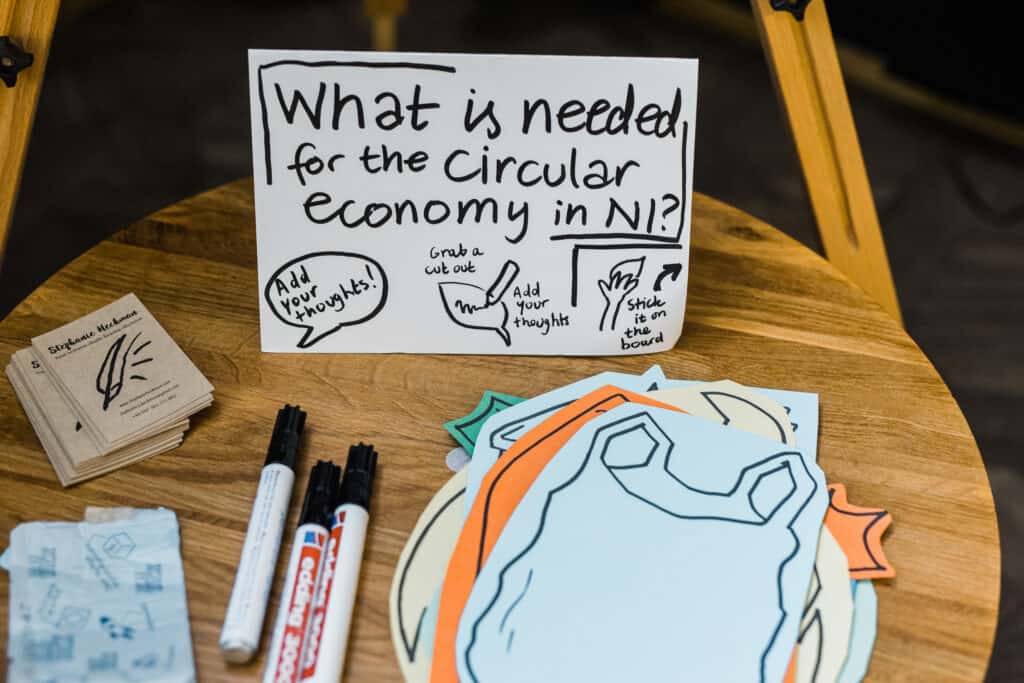NIRN welcomes the launch of the Draft Circular Economy Strategy for Northern Ireland, which sets out a comprehensive roadmap outlining the Department of Economy’s vision for the next decade. NIRN are pleased to see the new Strategy pursue an alternative model to
linear growth (a ‘take-make-waste’ model) and begin to rethink our use of planetary resources. As the Strategy makes clear, our current linear economy presents significant
environmental and social problems, and is based on a growth model which is not sustainable.
As both the Draft Circular Economy Strategy and the Circularity Gap Report illustrate, we are living in a way that is heavily carbon-intensive and resource-intensive. Every person in Northern Ireland consumes approximately 16.6 tonnes of resources per year – a figure which
must be halved to 8 tonnes by 2050. The annual material footprint of each person must be reduced to 8 tonnes if we are to keep the target of 1.5 degrees of global temperature rise within reach, and better align with the UN Sustainable Development goals and 2030 Agenda.
In Northern Ireland, our economy is only 7.9% circular. This means that 92% of it depends on materials from raw materials. The Strategy represents a solid step towards valuing the raw resources that we have, and using them more effectively. However, where there is significant emphasis on measuring ‘reuse’, we should see the same emphasis on ‘measuring resources’.
In many ways, reconnecting people with nature and the earth’s processes will help us do this. The Strategy recognises that halting further biodiversity loss and restoring nature are clearly important; yet, if we are to enact the ‘nature-positive future’ posited in the Strategy, economic
growth must be decoupled from resource use. The value of materials and resources should also be retained for as long as possible, and waste generation should be avoided entirely.
Among the multiple objectives of the Draft Strategy for the 10X Economic Vision, NIRN are especially pleased to see an emphasis on inclusion, sustainability, and the clear objective to develop skillsets. NIRN uphold that a transition to a circular economy should be just, and that people in Northern Ireland People should be supported through training and capacity-building to develop relevant skills, enabling them to move from carbon intensive industries into new, green jobs.
In addition to skills development and job creation, NIRN also welcome the Proposal 11: to ‘embed Circular Economy principles at all levels of education’. Making the Circular
Economy a reality means making changes in every aspect of our lives: from how we travel to what we eat to how we heat our homes. Undeniably, this represents a huge seismic shift at a societal level, and a significant psychological and behavioural shift at an individual level.
‘Rethink’ is one of the core principles underpinning the work of NIRN (along with ‘reuse’ and ‘repair’) and the Department must continue to galvanise support and earmark funding for
education programmes and awareness campaigns dedicated to Circular Economy. As the Strategy makes clear, the Eco-Schools initiative in Northern Ireland has successfully
increased students’ environmental knowledge, particularly with regards to climate action and biodiversity, and the Circular Economy should be integrated as a core topic in the programme. Almost 9 in 10 adults don’t know what the ‘Circular Economy’ means, and people need to learn about its core ideas and benefits.
Going forward, the Strategy outlines strong recommendations, including: to finance infrastructure and research and to measure progress in waste data collection. However, NIRN propose two other recommendations to be fully explored and developed: firstly, proactive
considerations of zero waste (rather than ‘reducing waste’) and secondly, highlighting the role of community-led solutions. As recommendations, zero waste and community action are intricately connected, and as the representative body for reuse and repair in Northern Ireland, NIRN has a strong community ethos. NIRN imagines a world where waste does not exist, where everything we own has value, and where people’s skills are also valued and utilised.
There are many examples of organisations in Northern Ireland, like Belfast Tool Library and Zero Waste North West, which demonstrate how communities deliver the Circular Economy ‘on the ground’ with much success and local engagement. Ultimately, this Strategy represents an important first step in relation to Northern Ireland
transitioning away from an unsustainable, linear economy and towards a circular one.
Consultations are, undoubtedly, an invaluable part of the government’s approach to policymaking, and engaging with stakeholders improves policy outcomes and enhances
public acceptability of a policy. NIRN would therefore encourage both members and nonmembers to respond to the Circular Economy Draft Strategy using the online survey which can be accessed at the Circular Economy Consultation page on the nidirect website consultations.nidirect.gov.uk.
If you are unable to respond using the online consultation facility, you can email your response to the following email address: ces@economy-ni.gov.uk
The consultation opened on 9th January and will close on the 20th March.
